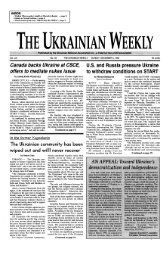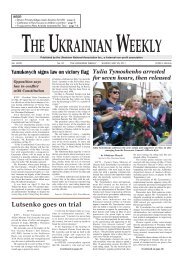Kyiv - The Ukrainian Weekly
Kyiv - The Ukrainian Weekly
Kyiv - The Ukrainian Weekly
You also want an ePaper? Increase the reach of your titles
YUMPU automatically turns print PDFs into web optimized ePapers that Google loves.
No. 3Presidential election...(Continued from page 1)in June 1996, gives the president suchpowers temporarily; they are to expire inJune of this year if the nation’s chiefexecutive cannot win the approval ofeither the Verkhovna Rada or Ukraine’scitizens to extend them.<strong>The</strong> president first suggested that hemay call a referendum to retain his constitutionallymandated authority when hespoke at a meeting of Ukraine’s regionalpress in <strong>Kyiv</strong> in early December and reiteratedit on January 10 in Ternopil.According to President Kuchma, withoutthis extraordinary authority, completingeconomic reforms will be impossiblegiven the paralysis in the VerkhovnaRada and the resistance of a majority ofnational deputies toward movement to afree-market system.Ukraine’s Communist Party jumpedon the referendum bandwagon onJanuary 11, after hearing rumors that apublic vote on changes to theConstitution was in the works.Verkhovna Rada Vice-Chairman AdamMartyniuk, who is a member of theCommunist faction, responded to reportsthat a petition-gathering campaign led byoblast leaders had begun for a popularreferendum on the president’s two proposalsby stating that his party woulddemand that questions on abolishing thepresidency and making Russian a secondstate language also be considered.Mr. Martyniuk said the party’s cadreshad been instructed to attend any localmeetings at which the issue of a referendummight be raised. “<strong>The</strong> Communistsare prepared to assist the presidentialstructures in calling a nationwide referendum,”said Mr. Martyniuk.Verkhovna Rada ChairmanOleksander Tkachenko on January 12attempted to quash any plans for a referendumorganized by the executivebranch. He said the executive branch,whether at the local or national level,does not hold the constitutional right toinitiate a national referendum. That right,according to Mr. Tkachenko, belongs to“citizens of Ukraine, political parties,public organizations and work collectives.”“Irrespective of specifically whatquestion on constitutional amendments isCanadian PM...(Continued from page 1)“It wasn’t until Monczak received ananonymous phone call from Ukraine thathe learned of Ivan’s whereabouts,” theSun reporter wrote.Ivan Nestor Monczak, who has brownhair and blue eyes, was born in Montrealon November 9, 1992, and appears on theChild Cyber Search Canada (CCSC) website(http://www.childcybersearch.org/),which also carries a photo and informationabout his mother.Upon the advice of Halyna Freelandof the <strong>Ukrainian</strong> Legal Foundation, Dr.Monczak retained Ukraine-based juristNatalia Petrova, and the matter was formallybrought before a court in Ukrainein November 1998.Soon afterwards an official diplomaticdispatch on the subject from Canada’sMinistry of Foreign Affairs was forwardedto Ukraine.Reached by <strong>The</strong> <strong>Weekly</strong> on January12, Sophie Galarneau of the PrimeMinister’s Office (PMO) said Mr.Chrétien has been apprised of the caseand that he does intend to raise the matterwith officials in Ukraine, but addedthat such assurances are “hard to confirm.”She cautioned that “it alwaysdepends on events, the situation and theTHE UKRAINIAN WEEKLY SUNDAY, JANUARY 17, 1999 3initiated by the executives of local bodiesof government, such actions are inadmissibleand shall be prevented,” said Mr.Tkachenko.On January 13 President Kuchma’spress secretary, Oleksander Martynenko,denied that President Kuchma or hisadministration had anything to do withgathering petitions. “Neither the presidentnor the presidential administrationhave any connection to any massiveactions for a referendum,” said Mr.Martynenko.<strong>The</strong> president’s press secretary said hehad information that the Rukh Party andthe National Democratic Party had begunpetition-gathering initiatives. “From whatwe understand, in Lviv more than 90,000signatures have already been gathered,”said Mr. Martynenko.No one from the Rukh press officewas available to comment on the party’srole in organizing a referendum.<strong>The</strong> NDP, while neither confirmingnor denying that it is responsible forgathering signatures on a possible referendum,said the issue of deputies’ immunityshould be decided by the Parliament.An NDP leader, Volodymyr Filenko,explained that the general issue of immunityshould be considered in parallel withthe specific cases of Messrs. Lazarenkoand Agafonov. “<strong>The</strong> Verkhovna Radashould decide this question on its own,without waiting for a referendum,” saidMr. Filenko.<strong>The</strong> Communist faction, meanwhile,had put together a draft bill on amendmentsand addenda to the Constitution providingfor the cancellation of the presidency.On January 12 party leaders presenteda motion that the Constitutional Courtreview the bill to confirm its legality. <strong>The</strong>motion was put to the Verkhovna Rada fora vote three times on January 12 and twicemore the following day, each time failingto receive a majority of 226 votes.Even with the fifth failure, ChairmanTkachenko said the Parliament wouldreturn to the motion and the bill onJanuary 14.<strong>The</strong> same day, President Kuchma’spress secretary, Mr. Martynenko, tookpains to inform reporters that the presidentdoes not support the bill. “I don’tknow if it needs to be said, but the presidentsupports the institution of the officeof the president,” said Mr. Martynenko.circumstances.”Dr. Monczak told <strong>The</strong> <strong>Weekly</strong> thatIvan’s mother tried to abduct their son,an only child, once before. He said thatin the summer of 1994 he returned fromwork to find both Ms. Bartchouk andIvan missing. After a frantic search, theyturned up at an abused women’s shelterin Montréal.Ms. Bartchouk filed for divorce at thattime and was granted custody of theirson. However, Dr. Monczak’s petition fora restraining order on his wife, whichbanned her from leaving the municipalityof Montréal, was also granted that year.<strong>The</strong> divorce was finalized by aQuébec Superior Court decision on May1996. According to Dr. Monczak, in hisdecision Judge Herbert Marks establishedthat accusations of assault on Ms.Bartchouk and Ivan were without foundation(by his wife’s admission). “I spent$45,000 countering perjury,” the cancerresearcher said.Dr. Monczak met his ex-wife in <strong>Kyiv</strong>in July 1990 during a <strong>Ukrainian</strong> medicalsociety visit to the <strong>Ukrainian</strong> capital. <strong>The</strong>couple were married in Montreal inOctober 1991. Ms. Bartchouk was grantedlanded immigrant status in January1993.Dr. Monczak said his former spouse isa journalist by training, that she worked<strong>Ukrainian</strong> government denies reportsof mercenaries fighting in Sierra LeoneWASHINGTON – Several majorAmerican newspapers, quoting theauthorities in Sierra Leone, have recentlypublished information about the participationof <strong>Ukrainian</strong> citizens on the sideof rebels in the civil war that ravages thatcountry. <strong>The</strong> Embassy of Ukraine hasresponded that neither the Ministry ofForeign Affairs of Ukraine, nor other relevantstate authorities of Ukraine haveany information to support allegationsmentioned in the news reports.According to the InternationalConvention Against Recruitment, Use,Financing and Training of Mercenaries,adopted by the United Nations in 1989,mercenary activity is qualified as acrime. Ukraine signed the convention in1990 and ratified it in 1993.U.S. delegation in <strong>Kyiv</strong>...(Continued from page 1)He praised Ukraine for stabilizing itscurrency and working out new debtrepayment schedules with its domesticand foreign creditors.Mr. Pascual, President Clinton’s chiefnational security advisor on Ukraine andRussia, said Ukraine must come up witha clear strategy to convince Congressthat the country is moving, not merely tostabilize the country, but towards economicgrowth. “In the end a climatemust be created to move beyond stabilityto growth,” explained Mr. Pascual. “Thatgrowth is the foundation for creatingjobs and giving people stability in theirlives.”He said that little changes are asimportant as major overhauls, and citedas an example the need to allow the ministriesof finance and treasury to obtaincontrol over budget accounts that in thepast have been off the budget. “It is criticalto developing trust among taxpayersthat their taxes are being spent effectively,”said Mr. Pascual.He also suggested that the governmentshould get out of the oil and energy businessand allow “strategic investors” to takeover in those and other major industries.at a museum of literature in <strong>Kyiv</strong> whenthey met and found employment as along-distance telephone clerk when livingin Montréal.As corroborated by the Toronto Sunstory, in Judge Marks’ May 1996 decision,both parents were forbidden tomake out passports in Ivan Monczak’sname without written permission fromthe other. According to the January 5report, police are treating the case as anabduction because Dr. Monczak’s exwifeviolated a court ruling that forbadeanyone from taking Ivan out ofQuébec.Mr. Dunn wrote that “the same courtgranted full custody to Monczak after theabduction and issued a writ of HabeasCorpus ordering the child be broughtback.”Dr. Monczak said that if the primeminister fails to get his son back he willhave to travel to Ukraine and plead hiscase before a foreign court. <strong>The</strong> first formalhearing on the issue is scheduled totake place in <strong>Kyiv</strong> on February 2.Dr. Monczak told Mr. Dunn onJanuary 4 that his son “is the biggesttreasure I have. He has been abducted. Agreat injustice has been [done] to him,and I think my government, my primeminister, should stand up for this littleboy.”Having acceded to this internationaldocument, the Embassy stated, Ukrainepledged to undertake all necessary measuresto counter such activity. Article 63-1 of the Criminal Code of Ukraine envisagesimprisonment from three to 12 yearsfor “recruiting, financing, maintainingand training mercenaries,” as well as for“participation without sanction of relevantstate authorities in armed conflictsof other states with the goal of receivingmaterial or other personal benefits.”Should the specific facts of mercenaryactivity by the citizens of Ukraine,including that in Sierra Leone, be confirmed,those involved would be subjectto criminal punishment in accordancewith the laws of Ukraine, noted theEmbassy of Ukraine.<strong>The</strong> group also discussed with <strong>Kyiv</strong>officials a list of claims by U.S. investorsagainst <strong>Ukrainian</strong> businessmen. Many ofthe disputes are holdovers from lastyear’s certification criteria, whichrequired only that Ukraine show substantialprogress in resolving the disputes.Seven claims still have not been settled,including ownership of Gala Radio in <strong>Kyiv</strong>and the Roksolana Hotel in Ivano-Frankivsk. Also outstanding are severaldisputes over agricultural equipment, andthe granting of a permit to build a hotel in<strong>Kyiv</strong>. Mr. Taylor explained that he believesall are resolvable. “In all the disputes, solutionsare possible. <strong>The</strong> two sides must simplywork to resolve them,” said Mr. Taylor.Mr. Truman of the TreasuryDepartment and U.S. Ambassador toUkraine Steven Pifer acknowledged thatsome of the U.S. criteria for disbursementof foreign aid mirror requirementsput forth by the International MonetaryFund’s Extended Fund Facility (EFF)agreement with Ukraine, in which thefinancial organization has agreed to providemore than $2 billion in credits to thecash-strapped country.Mr. Truman said tax reform and theimplementation of a realistic budget withaccurate macroeconomic figures are keysteps in meeting both IMF and U.S.Congress criteria.An IMF mission arrived in <strong>Kyiv</strong> theday after the departure of the U.S. delegationto begin discussion and analysisof the 1999 <strong>Ukrainian</strong> budget and <strong>Kyiv</strong>’scompliance with EFF requirements. <strong>The</strong>IMF delayed the last installment of itscredit extension until it could review the1999 budget, which Ukraine’sVerkhovna Rada approved on December31, 1998, after a considerable battleamong left and center-right forces.<strong>The</strong> U.S. delegation also expressedsatisfaction with the pace of the KharkivInitiative, a promise by the U.S. to stimulatebusiness activity in the KharkivOblast given after the <strong>Ukrainian</strong> governmentagreed not to sell turbines manufacturedby a Kharkiv factory to Russia,which is building a nuclear reactor forIran in the city of Bushehr.Mr. Taylor said a joint <strong>Ukrainian</strong>-U.S. business center had opened inKharkiv late in 1998, which would helpto match U.S. investors with Kharkivfirms. Ambassador Pifer added thatKharkiv-area businesses finally had formulatedbusiness plans and prospectuses“for Mr. Taylor’s office and the U.S.Department of Commerce to convey tothe thousands of U.S businesses thathave expressed interest in doing businesshere.”“<strong>The</strong> U.S. can now act as a broker forbringing these people together,” explainedAmbassador Pifer.

















